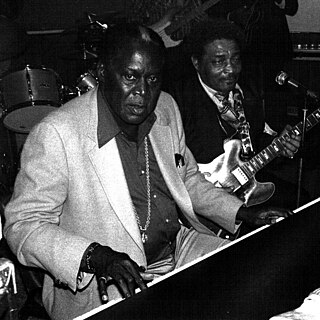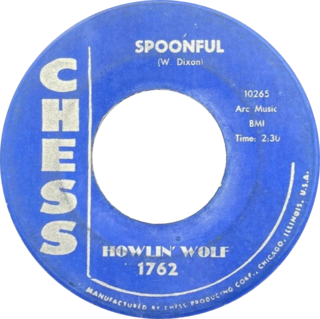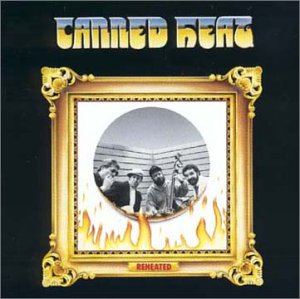Related Research Articles

John Len Chatman, known professionally as Memphis Slim, was an American blues pianist, singer, and composer. He led a series of bands that, reflecting the popular appeal of jump blues, included saxophones, bass, drums, and piano. A song he first cut in 1947, "Every Day I Have the Blues", has become a blues standard, recorded by many other artists. He made over 500 recordings.

Freddie King was an American blues guitarist, singer and songwriter. He is considered one of the "Three Kings of the Blues Guitar". Mostly known for his soulful and powerful voice and distinctive guitar playing, King had a major influence on electric blues music and on many later blues guitarists.

Samuel Gene Maghett, known as Magic Sam, was an American Chicago blues musician. He was born in Grenada County, Mississippi, and learned to play the blues from listening to records by Muddy Waters and Little Walter. After moving to Chicago at the age of 19, he was signed by Cobra Records and became well known as a bluesman after the release of his first record, "All Your Love", in 1957. He was known for his distinctive tremolo guitar playing.

Matthew Tyler Murphy, known as Matt "Guitar" Murphy, was an American blues guitarist. He was associated with Memphis Slim, The Blues Brothers and Howlin' Wolf.

Morris Holt, known as Magic Slim, was an American blues singer and guitarist. Born at Torrance, near Grenada, Mississippi, the son of sharecroppers, he followed blues greats such as Muddy Waters and Howlin' Wolf to Chicago, developing his own place in the Chicago blues scene.

"Goin' Down Slow" or "Going Down Slow" is a blues song composed by American blues singer St. Louis Jimmy Oden. It is considered a blues standard and "one of the most famous blues of all".

"Spoonful" is a blues song written by Willie Dixon and first recorded in 1960 by Howlin' Wolf. Called "a stark and haunting work", it is one of Dixon's best known and most interpreted songs. Etta James and Harvey Fuqua had a pop and R&B record chart hit with their duet cover of "Spoonful" in 1961, and it was popularized in the late 1960s by the British rock group Cream.

David William Kearney, known as Guitar Shorty, was an American blues guitarist, singer, and songwriter. He was known for his explosive guitar style and wild stage antics. Credited with influencing both Jimi Hendrix and Buddy Guy, Guitar Shorty recorded and toured from the 1950s until the 2020s. In 2017, Billboard magazine said, "his galvanizing guitar work defines modern, top-of-the-line blues-rock. His vocals remain as forceful as ever. Righteous shuffles...blistering, sinuous guitar solos."

Black Magic is a studio album by Chicago blues musician Magic Sam. Delmark Records released it under the name of "Magic Sam Blues Band" in November 1969, shortly before his death. The album was a follow-up to Magic Sam's highly influential studio debut, West Side Soul (1968), and also includes a mix of originals with songs written by his contemporaries.

Reheated is the twelfth album by Canned Heat, released in 1988. It features two members of the band's classic lineup, Fito de la Parra and Larry Taylor. Among the titles, "Bullfrog Blues" was originally on the B-side of the first single recorded by Canned Heat in 1967; "Built for Comfort" by Willie Dixon was popularized by Howlin' Wolf; "Take Me to the River" is a R&B/soul song which has been recorded by artists such as Al Green and Talking Heads.

"Hide Away" or "Hideaway" is a blues guitar instrumental that has become "a standard for countless blues and rock musicians performing today". First recorded in 1960 by Freddie King, the song became a hit on the record charts. It has been interpreted and recorded by numerous blues and other musicians and has been recognized by the Rock and Roll Hall of Fame and the Grammy Hall of Fame.

Billy Branch is an American blues harmonica player and singer of Chicago blues. Branch is a three-time Grammy nominee, a retired two-term governor of the Chicago Grammy Chapter, an Emmy Award winner, and a winner of the Addy Award. In addition, he has received numerous humanitarian and music awards.
"One Way Out" is a blues song that was recorded in the early 1960s by both Sonny Boy Williamson II and Elmore James. A reworking of the song by G. L. Crockett, titled "It's a Man Down Here", appeared on the Billboard record charts in 1965. In 1971, the Allman Brothers Band recorded an updated live version of the song, which was included on their popular Eat a Peach album (1972).

Arley "Buster" Benton was an American blues guitarist and singer. He played guitar in Willie Dixon's Blues All-Stars and is best known for his solo rendition of Dixon's song "Spider in My Stew." Benton was tenacious, and despite the amputation of parts of both legs in the latter part of his lengthy career, he never stopped playing his own version of Chicago blues.
Johnny B. Moore is an American Chicago blues and electric blues guitarist, singer and songwriter. He was a member of Koko Taylor's backing band in the mid-1970s. He has recorded nine solo albums since 1987. Moore's music retains a link to the earlier Chicago blues of Jimmy Reed and Muddy Waters, who also travelled to Chicago from the Mississippi Delta.

His Best is a greatest hits album by Chicago blues harmonica player Little Walter, released on June 17, 1997 by MCA and Chess Records as a part of The Chess 50th Anniversary Collection. The album is seen as the CD successor to the 1958 The Best of Little Walter and features ten of the songs from that album.

Cash McCall was an American electric blues guitarist, singer and songwriter. He was best known for his 1966 R&B hit "When You Wake Up". Over his long career, his musical style evolved from gospel music to soul music to the blues.

Lightnin' and Co. is an album by the blues musician Lightnin' Hopkins, recorded in Texas in 1962 and released on the Bluesville label. The album was reissued in 1981 on Fantasy Records as a double LP compilation titled How Many More Years I Got, with additional tracks from the sessions.

Chicago/The Blues/Today! is a series of three blues albums by various artists. It was recorded in late 1965 and released in 1966. It was remastered and released as a three-disc album in 1999.
References
- 1 2 Dahl, Bill. "Buster Benton –Biography". AllMusic . Retrieved August 12, 2022.
- ↑ Inaba, Mitsutoshi (2011). Willie Dixon: Preacher of the Blues. Scarecrow Press. ISBN 978-0-8108-6993-6.
- ↑ Dahl, Bill (2001). American Blues Volume 2 (Album notes). Various artists. Universal City, California: Fuel 2000. pp. 5–6. 302 061 110 2.
- ↑ Whitburn, Joel (1988). "Listings". Top R&B Singles 1942–1988. Menomonee Falls, Wisconsin: Record Research. pp. 40, 41, 552. ISBN 0-89820-068-7.
- ↑ Dahl, Bill. "Buster Benton: Spider in My Stew –Review". AllMusic . Retrieved August 12, 2022.
- ↑ Russell, Tony (1997). The Blues: From Robert Johnson to Robert Cray. Dubai: Carlton Books Limited. p. 91. ISBN 1-85868-255-X.
- ↑ "Buster Benton: 'Spider in My Stew' –Appears on". AllMusic . Retrieved August 12, 2022.